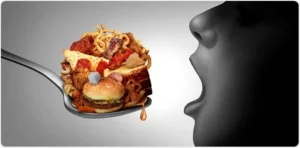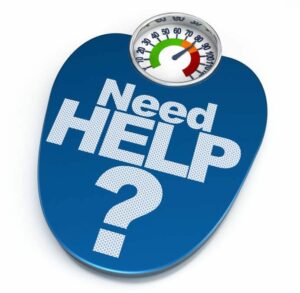If you’re reading this, there’s a good chance that you’re struggling with binge eating. You may feel like you’re out of control around food, and that your relationship with food is unhealthy. It’s time to start healing that relationship. In this blog post, we will discuss how to begin the process of recovery from binge eating. We’ll talk about the steps you need to take to get started on the road to healing. So if you’re ready, let’s get started!
Contents
Defining Binge Eating
 Binge eating is defined as eating an excessive amount of food in a short period of time. It’s often done in secret, and it can leave you feeling ashamed, guilty, and out of control. What many people fail to realize is the fact that it is an eating disorder. It’s a very real and serious problem that needs to be addressed.
Binge eating is defined as eating an excessive amount of food in a short period of time. It’s often done in secret, and it can leave you feeling ashamed, guilty, and out of control. What many people fail to realize is the fact that it is an eating disorder. It’s a very real and serious problem that needs to be addressed.
This disorder is more common than you may think. In fact, it’s estimated that about three percent of adults worldwide suffer from this disorder. That means that there are millions of people out there who are struggling with the same issue.
The demographic that is most affected by this disorder are women. It’s estimated that about four percent of women suffer from binge eating. This number is likely higher, as many people don’t seek help for their problems.
So why do people binge eat? There are a variety of reasons. For some, it may be due to an emotional issue. They may be using food to cope with something in their life. For others, it may be a physical issue. They may have a hormone imbalance that causes them to feel out of control around food. Whatever the reason, it’s important to understand that it’s not your fault. You didn’t do anything wrong, and you can’t just “snap out of it.”
Signs You Need Help For Binge Eating Recovery
The warning signs of this disorder vary from person to person. Ho wever, there are some common signs that you may be struggling with binge eating. If you experience any of the following, it’s important to seek help:
wever, there are some common signs that you may be struggling with binge eating. If you experience any of the following, it’s important to seek help:
- Eating more food than normal in a short period of time
- Feeling out of control around food
- Eating even when you’re not hungry
- Hiding food or eating in secret
- Feeling guilty, ashamed, or embarrassed after eating
- Using food to cope with emotions
If you’re struggling with any of the symptoms listed above, you may want to consider getting help.
Binge Eating Recovery Strategies
Luckily, there are many things you can do to start recovering from binge eating. Here are a few of the most effective strategies. These strategies can involve the help of a professional, or you can do them on your own. Even professional help has two different dimensions of approaches to help you with your binge eating. One is through psychological intervention and another is through nutritional guidance. In some cases, a combination of treatments may be recommended.
Psychological Intervention
It is a very important reminder that eating disorders are also a matter of psychological and emotional well-being and not just a physical issue. Binge eating disorder is often caused by deep-seated emotional issues such as low self-esteem, depression, anxiety, and trauma. If you want to heal your relationship with food, you need to address these underlying issues. A therapist can help you understand the root cause of your binge eating and develop a plan to address it.
Therapy
 Therapy for eating disorders works to help the individual develop a healthier relationship with food. This may include learning how to eat for their health, without fixating on specific nutrients. Therapy can also help the individual to understand and change their distorted beliefs about food and nutrition. Some of the most common therapy approaches that can treat orthorexia include:
Therapy for eating disorders works to help the individual develop a healthier relationship with food. This may include learning how to eat for their health, without fixating on specific nutrients. Therapy can also help the individual to understand and change their distorted beliefs about food and nutrition. Some of the most common therapy approaches that can treat orthorexia include:
- Cognitive-behavioral therapy (CBT): CBT is a type of therapy that focuses on changing negative thinking patterns and behaviors.
- Dialectical behavior therapy (DBT): DBT is a type of therapy that focuses on teaching people how to manage their emotions.
- Family-based therapy (FBT): FBT is a type of therapy that works with the family to help support the individual suffering from an eating disorder.
- Acceptance and commitment therapy (ACT): ACT is a type of therapy that focuses on acceptance and commitment to change.
- Interpersonal psychotherapy (IPT): IPT is a type of therapy that focuses on relationships and interpersonal interactions.
Each person will respond differently to treatment, so it is important to work with a professional who can tailor a plan to the individual’s needs. In some cases, a combination of therapies may be recommended.
Medication
In some cases, medication may be recommended to treat underlying conditions such as anxiety or depression. This can be helpful in treating eating disorders by reducing symptoms that may be contributing to the disorder. Although there are no specific medicines for treating disorders, medication can be a valuable tool in managing symptoms. These can include:
- Selective serotonin reuptake inhibitors (SSRIs)
- Serotonin-norepinephrine reuptake inhibitors (SNRIs).
- Tricyclic antidepressants (TCAs)
- Antipsychotics
- Anxiolytics
These work by increasing levels of certain chemicals in the brain, which can help to improve mood and reduce anxiety as well as treat the underlying psychological contributors of binge eating.
If you decide to undergo medication, it is important to work with a psychiatrist or other mental health professional who can closely monitor your condition and adjust your medication as needed.
Nutritional Counseling
 A registered dietitian will work with you to develop a healthy eating plan that meets your nutritional needs. They will also teach you about the importance of balanced nutrition and how to make healthier food choices.
A registered dietitian will work with you to develop a healthy eating plan that meets your nutritional needs. They will also teach you about the importance of balanced nutrition and how to make healthier food choices.
The additional need for nutritional counseling in addition to psychological help becomes evident when we consider that patients with eating disorders often have a distorted view of their bodies and the food they eat. Nutritional counseling can help to correct these distortions and provide patients with the tools they need to make healthier choices. Some of the most effective and popular tools of nutritional counseling for binge eating recovery include:
- Meal planning: This involves working with a registered dietitian to plan meals that are nutritious and meet your caloric needs.
- Food journaling: This involves keeping track of what you eat in a journal. This can help you become more aware of your eating habits and make healthier choices.
- Nutrition education: This involves learning about the importance of balanced nutrition and how to make healthier food choices.
- Monitoring your portion sizes: This means being aware of how much you are eating and making sure that you are not overeating.
- Making healthy choices when eating out: This means choosing restaurants that offer healthy options and avoiding processed foods.
- Cooking skills training: This involves learning how to cook healthy meals. This can help you make healthier choices when eating out or cooking at home.
- Exercise: Exercise is an important part of PHP treatment. Exercise can help to improve your mood, increase energy levels, and reduce stress.
- Mindful eating: Mindful eating is a practice that helps you to be more aware of your thoughts and feelings about food. It can help you to eat in a more mindful way and also make healthier choices.
All of these tools can help patients develop a more positive relationship with food and their bodies.
Self-Help Strategies
 Self-help is rightly referred to as a “process,” because it is one that requires time, effort, and commitment. There are a number of self-help strategies that can be useful in the treatment of binge eating disorders. Some of the most popular include:
Self-help is rightly referred to as a “process,” because it is one that requires time, effort, and commitment. There are a number of self-help strategies that can be useful in the treatment of binge eating disorders. Some of the most popular include:
- Read books or articles about eating disorders: This can be helpful in increasing your understanding of the disorder and how to recover. You can also utilize online resources or support groups.
- Identify trigger foods: Trigger foods are those that cause an intense preoccupation with food or nutrition. Identifying these foods can also be helpful in preventing binge eating by helping the individual to avoid them.
- Eat regular meals: Eating regular meals can be helpful by helping to regulate blood sugar levels and preventing feelings of deprivation. It also regulates the body’s natural hunger cues.
- Avoid dieting: Dieting can trigger binge eating behaviors. Avoiding dieting can be helpful by preventing a cycle of restriction and bingeing. This is because diets often lead to feelings of deprivation and can trigger binge eating.
- Keep a food journal: This can help you to become more aware of your thoughts and feelings around food and nutrition. You can utilize a food journal to track your eating habits, emotions, and thoughts.
- Plan ahead: This means having healthy snacks on hand and knowing what you will eat ahead of time. This is helpful in preventing impulsive eating and making sure that you are getting the nutrients you need.
- Find other hobbies and interests: This can help to take your focus off of food or thoughts about it. It may also help to provide a sense of purpose and meaning. For example, if you feel the urge to binge, you can go for a walk or call a friend instead.
- Indulge in physical exercise: Exercise has many benefits, including reducing stress and improving mood. Exercise can be helpful in treating binge eating by helping the individual to cope with difficult emotions and improve their overall well-being.
- Adopt mindfulness-based approaches: These approaches help the individual to focus on the present moment and become more aware of their thoughts and feelings. This can be helpful in treating binge eating by helping the individual to become more aware of their thoughts as well as feelings about food and nutrition.
- See food in a positive light: Trying to get back to normal eating while having or recovering from an eating disorder can feel daunting. But it’s important to see food in a positive light. Food is not the enemy. It’s fuel for your body and mind.
- Find what works for you: There is no “right” way to eat if you have anorexia. What works for one person may not work for another. It’s important to find an eating style that works for you and that you can further stick with in the long term.
- Develop a support system: A support system can be invaluable when struggling with any kind of problem. When it comes to compulsive overeating, a support system can provide emotional and practical support.
By adopting these strategies, you can begin to develop a more positive relationship with food and your body. These tools can help you to heal from binge eating and further live a healthier life.
Things To Keep In Mind
Now that we know some of the best ways to heal our relationship with food, it’s important to keep a few things in mind:
- You are not alone. There are many people who have recovered from binge eating and gone on to lead happy, healthy lives.
- Healing looks different for different individuals. This means that there is no “right” way to heal. This is why comparisons and perfectionism are not helpful. The process of healing can be difficult and challenging at times. But it is possible.
- Refrain from making any definitive statements about your relationship with food. For example, avoid saying things like “I will never binge again” or “I will never eat X food again.” Focus on the present moment as well as take things one day at a time.
- Give yourself grace and be patient with yourself. The healing process can take time. but know that you are worth the effort. Allowing yourself space to make mistakes and learn from them is an important part of the process.
- The process of recovery is not linear. There will be good days and bad days. The important thing is to keep moving forward. No matter what anyone has ever told you, you are worthy of healing and happiness.
Recovery is possible. No matter how hopeless you may feel, recovery is always possible. Reach out for help and take the first steps today. There are people as well as resources available to help you on your journey.
Conclusion
Conclusively, we can determine that there are a few different methods that can be taken in order to help heal your relationship with food if you’re on a journey of binge eating recovery. Some of these steps include getting help from a professional or by adopting self-help habits. However, it’s important to note that what works for one person might not work for another. If you or someone you know is struggling with an eating disorder, please seek help. Eating disorders can be serious and also life-threatening.
If you or someone you know is looking for psychological help, Therapy Mantra is here for you. We are the leading providers of online therapy and counseling. Our team of highly trained and experienced therapists can provide assistance at the most affordable rates. We also have a team of nutritionists providing nutritional counseling to manage food-related problems. Contact us today to learn more about our services. You may also visit our website to book an online therapy session or download our free Android or iOS app for more information.


